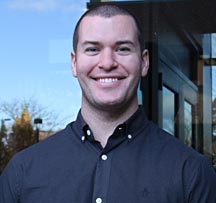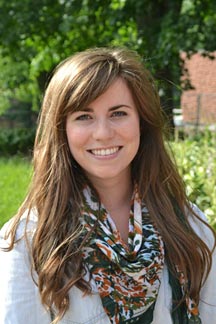A. Luke MacNeill
Luke was born and raised in Saint John, New Brunswick. He developed an interest in media at an early age and enrolled in film school in New York City in 2005. After graduation, he moved back to New Brunswick to pursue his other passion: psychology. He received his Bachelor of Arts in Psychology (First Class Honours) in 2011, and his Master of Arts in Experimental Psychology in 2014. He is currently working toward his PhD in Experimental Psychology at the University of New Brunswick in Saint John. His present research combines his interests in media and psychology by examining how attachment to minority television characters reduces prejudicial attitudes toward real-life minorities. Luke’s graduate schooling is supported by a Joseph-Armand Bombardier Doctoral Scholarship from the Social Sciences and Humanities Research Council (SSHRC). He is honoured to receive additional support from the O’Brien Foundation, which will allow him to complete his research and present his findings to a national audience. Following graduation, he hopes to attain an academic position and continue with his work on media attachments.
Amanda Cavanagh
Amanda grew up in Quarryville New Brunswick, where her interest in biology grew from exploring the banks of the Miramichi River. Her research interest in plant ecology and physiology began during her Bachelor of Science (Honours) program at the University of New Brunswick. Her honours project compared the benefits of reproductive strategies in plants, and contributed to the understanding of sex-determination in bryophytes.
She is currently pursuing a PhD. at the University of New Brunswick, where her research explores the mechanisms underpinning plant responses to global change at molecular and biochemical scales, and the implications of these responses for the larger ecosystem. Specifically, she hopes that this work will aid in the discovery of more resilient crop plants in future years. She has been supported by NSERC post-graduate awards at the Masters and Doctoral level, and she is honoured by the generous support of the O’Brien Foundation.
Daniel M. Chevrier

Daniel M. Chevrier was born in Fredericton, New Brunswick and raised in Stanley, New Brunswick by his parents Sara Dunton and Gerald Chevrier. After completing his high school education at Stanley High School in 2007, he left for Dalhousie University in Halifax, Nova Scotia to pursue an undergraduate degree in Science with initial interests in pharmacy and pharmaceutical drug design. After completing his first year in the general science program he then changed his focus to obtaining an undergraduate degree in chemistry. Daniel worked as a summer research assistant for Dr. Fritz Grein (Professor Emeritus in Chemistry, UNB Fredericton) from 2009-2010 conducting computational chemistry research. In 2011, he completed a BSc. degree in Honours Chemistry and went on to graduate school at Dalhousie University in the department of chemistry.
Daniel is currently in the fourth year of his PhD. degree in Chemistry under the co-supervision of Dr. Amares Chatt and Dr. Peng Zhang. His research is in the field of physical chemistry and involves the study of gold nanoparticle structure and properties through synchrotron-based spectroscopy techniques. The particular type of gold nanoparticle materials he currently investigates are promising for next generation biological imaging agents and high performance catalysts. Daniel was awarded the Alexander Graham Bell Canada Graduate Scholarship in 2014 for his academic and research efforts. Besides research, he has been involved with the chemistry graduate student society as an Outreach coordinator and as a past president. He enjoys a wide variety of outdoor physical activities from hiking to biking and currently plays guitar for the Halifax-based neo-soul band, Roxy and The Underground Soul Sound.
David Kingston

David Kingston was raised in Fredericton, New Brunswick. After graduating from Fredericton High School in 2007, he was recruited to Queen’s University on academic and athletic scholarships (varsity football). During his time at Queen’s David completed his Bachelor of Science (2011) and Master of Science (2013) in Kinesiology, with a focus on biomechanics. Currently, David is a PhD candidate in the Department of Kinesiology at the University of Waterloo in Waterloo, Ontario.
David has focused his research direction on mechanisms of kneeling and high knee flexion postures and their links to knee osteoarthritis risk in both work and leisure. By improving our fundamental knowledge of mechanical and structural implications of the knee joint in these postures, he aims to quantify the cumulative effects of high flexion loading. This research is critical to the future development and materials testing of knee prostheses and to establishing mechanisms of tissue degradation and failure.
Jason Hall

Jason Hall grew up amidst the emerald hillsides of Johnville, a small farming community in northern Carleton County, New Brunswick. Living in a rural community steeped in rich oral history and working close to the land fostered an appreciation of natural and human history. He studied history and anthropology at St. Thomas University, and then obtained a Masters in Environmental Studies from York University in Toronto. After working in the New Brunswick public school system for several years, Jason followed his dream and returned to university to pursue a Ph.D. in New Brunswick history and culture at the University of New Brunswick.
Jason’s dissertation research on the environmental and cultural history of the Wolustoq/St. John River provides new insight into Maliseet, Acadian, and British relationships to the watershed’s fish, riverbanks, and flow. It explores topics such as Maliseet and colonial agricultural, human adaptations to flooding and climate change, the development of property and conservation law, hydraulic engineering, fisheries, and riverine transportation. Jason combines on-the-ground experience with academic research and often walks the banks and paddles the reaches of the St. John River. He plans to adapt his dissertation into a book for academic and popular audiences. Jason believes that this work will help New Brunwickers better understand their past and contend with some of the most pressing problems currently facing the province such as riverine and coastal flooding, debates over removing hydro dams, climate change, and conflicts over natural resource development and conservation. Jason teaches part time at UNB and St. Thomas and has presented his work to public schools, First Nations, Anglophone, and Francophone communities, as well as regional and international scholars. After completing his degree, he hopes to find employment that will enable him to stay in, and contribute to, the province.
Jennifer Klinck

Jennifer is currently pursuing her LL.M. at the University of Cambridge. Jennifer obtained a joint B.C.L./LL.B degree from McGill University, receiving numerous academic distinctions throughout her studies and graduating second in her class. Following her studies, Jennifer clerked at the Supreme Court of Canada for the Honourable Mr. Justice Marshall Rothstein. She practiced constitutional and administrative law for three years in Ottawa, working under the direction of former Supreme Court of Canada Justice Michel Bastarache. She has been involved in litigation – including before the Supreme Court of Canada – dealing with issues of federalism, constitutional rights, procedural fairness, and substantive review of administrative decisions.
Jennifer is actively engaged in various pro bono initiatives. She is currently a member of the Cambridge Pro Bono Project’s Executive Committee and of Egale Canada’s Legal Issues Committee. She has acted as a student mentor with Pro Bono Students Canada, provided legal assistance to refugees as a summer intern with Lawyers for Human Rights in South Africa, and represented Amnesty International in a pro bono intervention before the Supreme Court of Canada. Jennifer’s work has been published in Canadian and international law journals. She is also the lead author of a chapter in M. Bastarache & M. Doucet, eds, Les droits linguistiques au Canada, 3rd ed.
Jennifer has been awarded the O’Brien Foundation Fellowship to support her doctoral studies in comparative public law. Her doctoral project will examine the relationship between courts and other democratic institutions – such as processes for public participation in government decision-making and independent oversight bodies that report to the public (e.g., ombudsmen) – as mechanisms for government accountability.
Jeremy Bourque

Jeremy was born and raised outside of Moncton, New Brunswick. After graduating from Moncton High School in 2009, he began his Bachelor’s degree at Mount Allison University in Sackville, NB. After discovering an interest in Chemistry, Jeremy worked several years under the supervision of Dr. Steve Westcott in the “Wild Toads” research group, where he synthesized and studied new hydroboration reagents, which are used in a common reaction in pharmaceutical synthesis.
After graduating in 2013 with an honours degree in Chemistry, he worked for Dr. L. Ross C. Barclay for several months, studying the oxidation properties of isotope-substituted fatty acids. He began his doctoral work in 2013 at the University of Western Ontario, under the supervision of Dr. Kim Baines. At Western, Jeremy is studying new, reactive complexes of gallium, with the goal of examining their ability to act as novel catalysts for a wide range of applications. In his spare time, Jeremy enjoys playing squash and hiking, as well as playing golf throughout the summer.
Mariah Malone

Mariah Malone is from a small community on the coast of New Brunswick. She has a background in English literature and sociology, having completed a Bachelor of Arts with honours at Mount Allison University in 2013. Inspired by her mother’s work in a long-term care facility, as well as a host of issues examined during her undergraduate work, Mariah is currently pursuing a Master of Arts Degree in Health Promotion at Dalhousie University in Halifax, Nova Scotia. The primary focus of her research is on healthy aging. Under the supervision of Dr. Brad Meisner, Mariah has designed a project that combines her research interests in aging, sexuality, and community-based research. Mariah is also part of a research unit (Research & Education on Aging & Community Health Unit) that strives to produce positive change in the lives of older people in our communities.
Mariah is most appreciative of receiving an O’Brien Fellowship as it will be a very helpful contribution as she continues her studies. She is proud to be supported by a Foundation that has supported so many dedicated and innovative researchers over the years.
Mayme Lefurgey

Mayme Lefurgey is a second year Ph.D. student at Western University and is pursuing a collaborative degree in Women’s Studies & Feminist Research and Transitional Justice & Post Conflict Reconstruction. She is supervised by Dr. Joanna Quinn, the founding Director of the Centre for Transitional Justice and Post-Conflict Reconstruction at Western. She is originally from Campbellton, New Brunswick. Mayme has completed her Master of Arts studies at the UN-Mandated University for Peace in Costa Rica as well as at the UNESCO Chair for Peace Studies MA Program in Peace, Development, Security and International Conflict Transformation at the University of Innsbruck in Austria.
Mayme has recently worked as a Domestic Violence Outreach Coordinator in New Brunswick and prior, as a Canadian International Development Agency (CIDA) International Youth Internship Program (IYIP) Gender Specialist in Malawi. She has also been an intern for the United Nations Development Program on issues of gender and sustainable development and has worked extensively with the UK-based African-diaspora organization, Make Every Woman Count. She currently works as an International Engagement Mentor for undergraduate students seeking to volunteer abroad with the US-based INGO, Omprakash. Mayme was recently awarded a 2014 YMCA Peace Medallion for her commitment to community peacebuilding and leadership.
Rachael Wyatt

The combined arts and science bachelor's degree program at the University of New Brunswick drew Rachael to Fredericton. She received bachelor degrees in English and Biology-Chemistry with honours from UNB in May, 2011. Her honours in plant biochemistry asked how the characteristics of a critical plant enzyme are different in boreal forest conifers from traditional standards used in global modelling such as spinach and tobacco. After completing her undergraduate studies, she moved to Montreal to pursue her other passion of poetry, supported by a SSRHC Master's award. The MA program at Concordia allowed her to continue studying English literature alongside the art of poetry. Her thesis, a book of poems about the Ginkgo tree, coalesced with her background in biology by making deliberate and varied uses of scientific language, theories and terminology. Homesick for the sciences and for bench work, she returned to Fredericton to take up a PhD position in Bryan Crawford's lab, but continues her contribution to the poetry community by writing periodic reviews.
Her current PhD work looks for the molecular underpinnings of cellular invasiveness that may help to better understand the phenotypes that cancer cells take on during metastasis. More specifically, her interest lies in how evolutionary differences in a particular family of extracellular proteases can affect a cell's ability to migrate across tissue boundaries. In addition to the generous support from the O'Brien Foundation, her research is also supported by NSERC and NBIF.
Sarah King

Sarah King is a PhD candidate in Education at the University of New Brunswick in Fredericton, New Brunswick. Her research examines how universities in Atlantic Canada educate for civic engagement, using appreciative methods to engage university students, staff, faculty, and administration in conversations about the future of the region and its post-secondary institutions.
Sarah was born and raised in rural Newfoundland, where she completed high school. She holds a B.Phil. in Interdisciplinary Leadership Studies from UNB’s Renaissance College, a B.Ed. in Junior/Intermediate Education from Brock University in St Catharines, Ontario, and a Master’s of Education from York University in Toronto, Ontario. Her Master’s study looked at how teaching young girls about female Holocaust resisters through historical fiction could help further anti-bullying initiatives in schools.
In addition to her PhD studies, Sarah is a part-time instructor at Renaissance College, and the program assistant for the Andrews Initiative, both at the University of New Brunswick Fredericton. These positions help to further her commitment to community-based and interdisciplinary education practices. Sarah is very grateful to the O’Brien Foundation for the support of her research and her commitment to the betterment of the Atlantic Canadian provinces.



